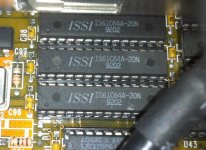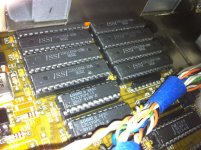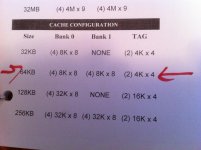I'm building a system based off an Am386DX-40 with a motherboard (VIP M319P1 TAM/40-P1) which has 64 KB of L2 cache installed on it.
A strange problem: when launching certain programs (like Wolfenstein 3D), the computer immediately reboots (no error screen or warnings).
Through trial and error, I got this to stop happening by disabling the L2 Cache in the BIOS Setup (American Megatrends 11/20/1991).
It looks like I have the cache set up correctly (correct number of chips, jumper settings on the motherboard match the manual for 64 K of L2 cache, cache enabled in BIOS).
Any ideas what the problem is? I've heard of "fake" cache chips on 386 motherboards, and it could be that one of the chips is bad - what's the best way to test this?



A strange problem: when launching certain programs (like Wolfenstein 3D), the computer immediately reboots (no error screen or warnings).
Through trial and error, I got this to stop happening by disabling the L2 Cache in the BIOS Setup (American Megatrends 11/20/1991).
It looks like I have the cache set up correctly (correct number of chips, jumper settings on the motherboard match the manual for 64 K of L2 cache, cache enabled in BIOS).
Any ideas what the problem is? I've heard of "fake" cache chips on 386 motherboards, and it could be that one of the chips is bad - what's the best way to test this?



